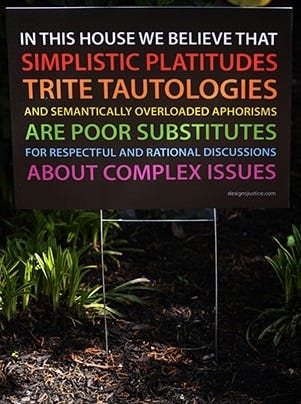Hypocrisy and Consequences
What engaged Americans and their sociopolitical obsessions perhaps require
In his famous 1971 tract Rules for Radicals, American activist and political theorist Saul Alinsky laid out several different “rules” to which political actors—namely from his camp on the radical left—should adhere in order to destroy their enemies and thus achieve political domination. Many took issue with his book—and by extension his rules—and it’s understandable since it reduced politics to a zero sum game in which victory at all costs transcended notions of democratic compromise. Such were the times in which Alinsky lived.
And, arguably, such are the times in the 21st century.
So while it’s certainly not surprising that not only have these tactics abounded within the political realm—both from the left and right frequently obsessing over each others’ very real and meaningful hypocrisy and double standards—it is certainly a little more surprising that a major political figure—a governor who no doubt has presidential aspirations, no less—would so flagrantly use one of Alinsky’s rules to score what on the face of it appears to be a major political victory (if you think delegitimizing your enemy’s stated values is a victory, rather than just a much-needed reality check). In other words, when Florida Governor Ron DeSantis sent up a couple flights to the affluent and largely, politically blue Martha’s Vineyard, he was operating right out of the Alinsky playbook by invoking the fourth rule:
“Make the enemy live up to its own book of rules.”
In short, this was a tactically brilliant move—take a page from the classic lefty activist playbook and use it against the very people who would, and do, use it against you, both in retrospect and in the present. You may call the move made by Governor DeSantis cynical—and you're right!—but you can’t deny the efficacy of the message, if only in how much cheap, low-resolution social pressure it puts on progressives: “Look at these elitist Democrats with their sanctimonious claims of loving migrants while calling the rest of us racists. Let’s see if they actually want this riff-raff in their own backyard.” And to be clear, elite progressives won’t suddenly start housing migrants on their own private properties (well, most won’t; there could always be edge cases and those who own other properties might do the right thing and give some of these Venezuelans some affordable housing until they can get on their feet). Many will indeed “go all NIMBY” and be outraged at what’s happening, and some will tune into NPR, who’s already focusing on how the migrants were lied to as if that was ever going to matter, and use the story as yet another proxy for how racist and evil Republicans are (still ignoring 2020 election demographic shifts, but whatever).
Putting aside the performative reveling in elite progressive hypocrisy (because I have no doubt in my mind that there are dozens if not hundreds of “In this house we believe...” and “All are welcome here” signs in Martha's Vineyard) and the fact that human lives are being used as political capital (which, by the way, is a tradition older than America and nothing anyone should ever complain about with a straight face if they have any party or ideological loyalty), this is a sociopolitically destabilizing tactic I'm starting to think we should see see employed more often with culture war issues. In other words, if conservative districts are complaining about CRT or woke education, progressive legislators should completely defund them and see how they do. If urban progressive districts are clamoring about defunding their police, do one better and essentially abolish them and send all the cops to different districts that actually want them there. Americans’ biggest problem as a people is that we don't understand consequences; I don't even think we have a proper understanding of cause and effect (so saying, as I often do, that Americans are crap when it comes to historical knowledge doesn't even really matter).
Culture war issues are largely empty of substance but given the illusion of substance by the outrage they provoke. The reason why we’re addicted to culture war issues is starting to become pretty obvious, at least to me: they are low-cost, high-reward. If one latches onto a culture war issue, they run very little risk of anything apart, perhaps, from losing their job if they go too hard in the paint and the job is subjected to pressure campaigns. But the rewards can be everything from 15 minutes of fame to lavish book deals, podcasts, and talk-show appearances. And while that’s fine for an enterprising fella or gal—trust me, I get it: I have “Chaos is a ladder” tattooed on my arm for a reason—it’s not sustainable long term for a healthy politic. And for a society with such poor understanding of history—of cause and effect—perhaps it’s time that there be some true, real world consequences injected into our patina, boutique social causes that no regular person actually wants. If anything, it could serve to rip the mask off our shared mass selfishness. And while I don’t think many of us would like what we see underneath, we could at least start to deal with each other honestly, thanks to our true motives being naked to the world.





